- Home
- Hermann Hesse
Steppenwolf Page 10
Steppenwolf Read online
Page 10
'May I?' I asked, sitting down beside her.
'Certainly, dear,' she said. 'And who are you, then?'
'Thanks,' I said. 'I can't possibly go home, I can't, I can't. I want to stay here, next to you, if you'll let me. No, I can't go home.'
She nodded as if understanding me and, as she nodded, I contemplated the lock of hair that ran down from her forehead past her ear, noticing that the faded flower she wore there was a camellia. Over in the back room the music was blaring out, while at the bar the waitresses were hastily calling out their orders.
'Just you stay here,' she said in a soothing voice. 'Why is it you can't go home, then?'
'I can't. There is something waiting for me at home. I just can't. It's too terrible.'
'Then let it wait, and stay here. Come on, give your glasses a clean first; you can't see a thing like that. There, give me your hanky. Now what shall we have to drink? Burgundy?'
She cleaned my glasses for me. Only now could I see her clearly: her pale, firm face with the lips painted blood-red, her bright grey eyes, her smooth, cool forehead, the short, tight lock of hair in front of her ear. In a kind, though slightly mocking, manner she took me under her wing, ordering the wine. Then, as we clinked glasses, she looked down at my shoes.
'My God, where have you been, then? You look as though you've walked it here from Paris! You don't go to a dance looking like that!'
I answered yes and no, laughed a little, and let her talk. I was amazed to find that I liked her a lot since until now I had avoided young girls like her, if anything viewing them with suspicion. The way she behaved towards me was exactly what I needed at this point to make me feel good, and in fact it has been like that whenever we have been together since. She treated me with precisely the degree of protectiveness I required, but poked fun at me too, just as judiciously. Ordering a sandwich, she commanded me to eat it. Pouring me a glass of wine, she told me to take a drink from it, but not too quickly. Then she praised me for being so obedient.
'There's a good boy,' she said, encouraging me. 'That wasn't so difficult, was it? I bet it's a long time since you last had to obey orders from somebody, isn't it?'
'You win. How did you know that?'
'Easy. Obeying orders is like eating and drinking; anyone who has gone without either for a long spell will think there's nothing quite like it. It's true, isn't it: you like obeying me?'
'Very much. You know everything.'
'That's not difficult in your case, my friend. I might even be able to tell you just what it is you are so afraid of, waiting for you there at home. But you yourself know what it is, so we don't need to talk about it, do we? What nonsense! People either hang themselves, in which case - well, they go ahead and hang themselves, no doubt for a good reason. Or they remain alive, in which case all they have to worry about is living. It's as simple as that.'
'Oh, if only it were that simple!' I cried. 'I swear to God I've done enough worrying about living, and it's got me nowhere. Hanging oneself may be difficult, I don't know, but living is much, much more difficult. God only knows how difficult it is.'
'On the contrary, it's child's play, as you will see. We've already made a start: you've cleaned your glasses and had something to eat and drink. Now we'll go and give your trousers and shoes a bit of a brushing; they could certainly do with it. And then you're going to shimmy with me.'
'You see, I was right after all!' I exclaimed eagerly. 'Nothing grieves me more than being unable to carry out one of your orders, but this one is beyond me. I can't shimmy; I can't waltz or do the polka either, or any of those things, whatever you call them. In all my life I've never learned how to dance. Not everything is as simple as you say it is. Don't you see that now?'
A smile appeared on the blood-red lips of the beautiful girl as she shook her firm head of boyish hair. Looking at her, it seemed to me at first that she resembled Rosa Kreisler, the first girl I had fallen in love with as a young boy, and yet she had been swarthy and dark-haired. No, I couldn't tell who this stranger of a girl reminded me of; all I knew was that it was someone from my very early youth, my boyhood days.
'Don't be so hasty,' she cried. 'Gently does it! So you can't dance? Not at all? Not even a one-step? And yet you claim to have gone to heaven knows how much trouble to make something of your life! You were telling a fib when you said that, my lad, and at your age people shouldn't still be telling fibs. Come on, how can you say you've gone to a lot of trouble to make something of your life when you don't even want to dance?'
'But what if I just can't? I've never learned how to.'
She laughed.
'But you have learned to read and write, haven't you, and you've learned arithmetic; probably Latin and French too, all sorts of stuff like that? I bet you spent ten or twelve years at school, then quite possibly went to university into the bargain. For all I know, you may even have a doctorate and can speak Chinese or Spanish. You see? But you've never managed to spare a bit of time and money for a few dance lessons! There, I told you so!'
'It was my parents,' I said, trying to justify myself. 'They got me to learn Latin and Greek and all that stuff. But they never made me learn to dance; it wasn't the fashionable thing to do in our family. My parents themselves never went dancing.'
She gave me a really icy look, full of disdain. Again I saw something in her face that reminded me of the earliest days of my youth.
'I see, so it's your parents who must take the blame! Did you also ask their permission to come to the Black Eagle tonight? Did you? They are long since dead, you say? Well then! If from sheer obedience to them you refused to learn to dance in your youth, that's all right with me, though I don't believe you were such a model son back then. But what about afterwards, what did you get up to in all the years afterwards?'
'Oh,' I confessed, 'I'm not sure myself now. I went to university, made music, read books, wrote books, travelled -'
'You have strange ideas of what it means to live! So you've always done difficult and complicated things, never once learning how to do the simple ones? No time for them? No desire? Well, fair enough, I'm not your mother, thank God. But then to pretend that you've given life a serious try and found it worthless, that simply won't do!'
'Don't take me to task,' I pleaded. 'I don't need you to tell me I'm mad.'
'Go on with you! Don't try to fool me. You're not the least bit mad, Herr Professor; indeed, you're nowhere near mad enough for my liking! You strike me as clever in a stupid kind of way, as true professors are. Come on, have another sandwich. Afterwards you can tell me more about yourself.'
She got me another sandwich, put some salt on it and a little mustard, cut a bit off for herself and ordered me to eat. I ate. I would have done anything she ordered me to, anything apart from dancing. It did me a power of good to obey someone, to sit next to someone who was questioning me, giving me orders and taking me to task. If only the professor and his wife had done that to me a few hours ago, I would have been spared a great deal. But no, it was a good thing they hadn't, because then I would have missed a great deal too!
'By the way, what's your name?' she suddenly asked.
'Harry.'
'Harry? That's a little boy's name! And a little boy is what you are, Harry, in spite of the odd grey patch in your hair. You're a little boy, and you should have somebody to keep a bit of an eye on you. I won't mention dancing again, but what about the state of your hair? Haven't you got a wife, or a sweetheart?'
'I've no wife now; we're divorced. I do have a sweetheart, but she doesn't live here. I very rarely see her; we don't get on very well with one another.'
She whistled softly through her teeth.
'It strikes me you must be a really difficult man if no woman can stick it out with you. But tell me now, what went wrong tonight specially? What made you wander the streets in a daze like that? Did you have a row? Had you gambled away all your money?'
I had some difficulty explaining why.
'You see,' I be
gan, 'it was actually something or nothing. I'd been invited to dinner at the home of a professor - though I'm not one myself - and I ought really not to have gone. I'm not used to that kind of thing any more, sitting and chatting with people. I've forgotten how. What's more, even as I entered the place I sensed that things would turn out badly. When hanging up my hat, the thought already occurred to me that I might need to take it back again in no time at all. And you see, at this professor's, there happened to be a picture on the table, a stupid picture that annoyed me -'
'What sort of picture?' she asked, interrupting me. 'Why were you annoyed?'
'Well, it was supposed to represent Goethe, you know, the great writer Goethe. But it wasn't Goethe as he looked in real life - actually we have no idea how he looked exactly, he's been dead a hundred years. No, some modern artist or other had produced a smart, well-groomed version of Goethe as he imagined him, and his picture annoyed me. I'm not sure whether you can understand why, but I found it horribly repugnant.'
'Don't worry, I can very well understand why. Go on.'
'I was already at loggerheads with the professor. He's a great patriot, as nearly all professors are, and during the war he did his bit to help deceive the nation's people - all in good faith, of course. But I'm an opponent of war. Well, no matter, let me go on. Of course, I needn't have looked at the picture at all -'
'You can say that again.'
'But in the first place, I felt really sorry for Goethe. You see, I'm very, very fond of him. And then one way or another I thought - I um ... the thing is I thought, or rather felt, something along the lines of: Here I am, sitting in the home of people I regard as like-minded, who I assume will have a similar liking for Goethe and pretty much the same image of him as me, and I now find they've got this tasteless, adulterated, saccharine picture on display. And, oblivious to the fact that the spirit of the picture is exactly the opposite of Goethe's, they find it splendid. They think it is wonderful - fair enough, they are of course entitled to their opinion - but as for me, any faith I have in these people, any friendship with them, any feeling of kinship or solidarity is immediately over and done with. Besides, we weren't such great friends anyway. So at that point I became really angry and sad, realizing that I was entirely on my own and that no one understood me. Do you see what I mean?'
'Of course, Harry, it's not difficult. And then what? Did you fling the picture at them, hit them on the head with it?'
'No, I cursed and swore, then I rushed off, intending to go home, but -'
'But there would have been no mummy waiting there to comfort her stupid baby boy, would there, or to give him a good telling-off. Oh dear, Harry, you almost make me feel sorry for you. You're a real big baby if there ever was one!'
I certainly was. I could see that now, or so it seemed to me. She gave me a glass of wine to drink. She was really mothering me, but from time to time I noticed momentarily how beautiful and young she was.
'So,' she began again, 'so famous old Goethe died a hundred years ago and our Harry, who is very fond of him, conjures up this wonderful picture of him in his head, imagining how he may have looked, as Harry is of course perfectly entitled to, that's right, isn't it? But the artist, who is also mad about Goethe and creates his own image of him, isn't entitled to; nor is the professor or anyone else at all, because that doesn't suit Harry. That's something he can't put up with. It makes him curse and swear, then he rushes off! If he had enough sense, he would simply laugh at the artist and the professor. If he were mad, he would chuck their picture of Goethe straight back in their faces. But since he's just a little boy he runs off home, meaning to hang himself ... I can well understand your story, Harry. It's a funny story. It makes me laugh. Hey, hold on, don't drink so quickly. You should take your time with burgundy, otherwise you'll get too hot. But then you need to be told everything, don't you, my little lad?'
She had a look of strict admonition on her face, just like that of a sixty-year-old governess.
'Indeed I do,' I said contentedly. 'Go on, tell me, just tell me anything.'
'What am I supposed to tell you?'
'Anything you like.'
'All right, I'll tell you something. For an hour now you've been listening to me using the familiar form "du", yet you are still addressing me formally as "Sie". Just like your blessed Latin and Greek, always making things as complicated as you possibly can. If a girl says "du" to you, and you don't exactly find her loathsome, you say "du" back to her. There, you've learned something new. And secondly: for half an hour now I've known that you're called Harry. Because I asked you your name, that's why. But you've no desire to know what I'm called.'
'Oh yes I have, I want very much to know your name.'
'Too late, little man! If we ever meet again, you can ask me once more. I'm not going to tell you today, so there you are. And now I fancy a dance.'
Since she moved as if to get up, I suddenly felt my spirits sink. I feared she would go and leave me on my own, and I would be back where I started. Just as a toothache that has fleetingly vanished can resurface, burning like fire, my anxiety and dread were back again in a trice. Lord only knows how I had managed to forget what was lying in store for me. Had anything really changed?
'Stop,' I cried. 'I beg you, young lady, not to ... uh, sorry ... I mean, don't leave me, dear. Of course you can dance, dance as much as you like, but don't stay away too long. Come back again, dear. Come back again.'
With a laugh, she stood up. I had imagined her to be bigger, but now that she was standing I could see that she was slim but not tall. Again she reminded me of someone, but who? I couldn't put my finger on it.
'You'll come back?'
'I'll come back, but I may be gone a while, half an hour or even an hour. I'll tell you what to do. Close your eyes and get a bit of sleep. That's just what you need.'
I made room for her to go. Her little dress brushed against my knees; then, as she walked away, I saw her glance at herself in a tiny round pocket mirror, raise her eyebrows and dab her chin with a miniature powder puff before disappearing into the ballroom. Looking around me, I saw strange faces, men smoking, spilled beer on the marble-topped table. All around I could hear shouting and shrieking, and from the next room the noise of dance music. She had told me to get some sleep. What an innocent child! Little did she know how shy a creature sleep was in my experience, even less likely to keep me company than a weasel. And she wanted me to sleep in this funfair of a place, sitting at a table with the clatter of beer mugs on all sides! I sipped at my wine, took a cigar out of my pocket and looked around for matches, but feeling no really strong desire to smoke, I put the cigar down in front of me on the table. 'Close your eyes,' she had said. Heaven knows where the girl had got that voice of hers from, that slightly deep, kind voice, like a mother's. It was good to obey that voice, as I had already discovered. Obediently closing my eyes, I leaned my head against the wall and, with hundreds of raucous sounds ringing in my ears, smiled at the thought of trying to sleep in this of all places. I decided to make my way to the ballroom door and steal a glance inside - after all, I couldn't miss seeing my beautiful girl dance. But only now realizing, as I moved my legs under the table, just how immensely tired I felt after wandering the streets for hours, I remained seated. And before I knew it I was already asleep, following mother's orders to the letter. I slept my fill, unable to get enough of it, and was thankful. And I dreamt, dreamt more clearly and beautifully than I had dreamt for ages. What I dreamt was this: -
I was sitting waiting in an old-fashioned anteroom. All I knew at first was that I had an appointment to see some dignitary or other. Then I suddenly realized that it was none other than Herr von Goethe who was to receive me. Unfortunately I was not there in a private capacity, but as the correspondent of a magazine. I found this very disturbing, unable as I was to understand what had landed me in such a situation. I was also worried by a scorpion that only a moment ago I had seen trying to climb up my leg. Although I had warded of
f the little black creepy-crawly by shaking myself, I didn't know where it was now, and I didn't dare make a grab for it.
I was not sure either whether I'd been granted an audience with Matthison3 rather than Goethe, but in my dream I must also have confused Matthison with Burger,4 since I ascribed the Molly poems to him. I would, by the way, have been delighted to meet Molly, whom I imagined to be a wonderful woman: soft, musical, nocturnal. If only I hadn't been sent there by the editor of that damned magazine! I was getting more and more annoyed at this, and bit by bit my annoyance shifted to Goethe too. Suddenly I found all manner of things to question and criticize him for. A fine audience this might turn out to be! But as for the scorpion, it was perhaps not so bad, even if it were a possible threat lurking somewhere quite close to me. You could, it seemed to me, put a more friendly interpretation on it. Perhaps, I thought, it had something or other to do with Molly. It might be some sort of harbinger of her, or the creature on her crest: a beautiful, dangerous heraldic creature representing femininity and sin. Might not this creature's name perhaps be Vulpius?5 However, at this point, a servant threw open the door and, rising from my seat, I went in.
Standing there stiffly was the small, ageing Goethe and - sure enough - the venerable Classic was sporting the sizeable star of some Order on his chest. It seemed he was still in a position of power, still granting audiences, still exercising control over the world from his Weimar museum. For scarcely had he cast eyes on me when, jerkily nodding his head like an old crow, he solemnly declared: 'Well, I suppose you youngsters find precious little to agree with in our person and all that we are striving to accomplish?'

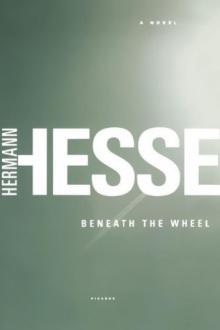 Beneath the Wheel
Beneath the Wheel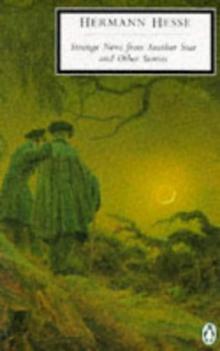 Strange News From Another Star
Strange News From Another Star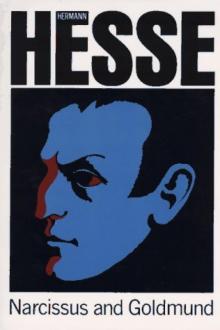 Narcissus and Goldmund
Narcissus and Goldmund Steppenwolf
Steppenwolf Siddhartha
Siddhartha Demian
Demian Knulp
Knulp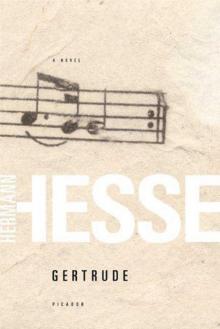 Gertrude
Gertrude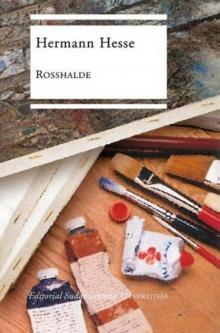 Rosshalde
Rosshalde The Glass Bead Game
The Glass Bead Game The Journey to the East
The Journey to the East Klingsor's Last Summer
Klingsor's Last Summer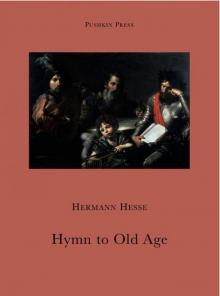 Hymn to Old Age
Hymn to Old Age Poems
Poems The Fairy Tales of Hermann Hesse
The Fairy Tales of Hermann Hesse Singapore Dream and Other Adventures
Singapore Dream and Other Adventures Soul of the Age
Soul of the Age